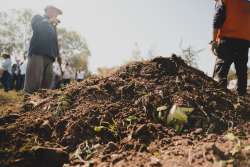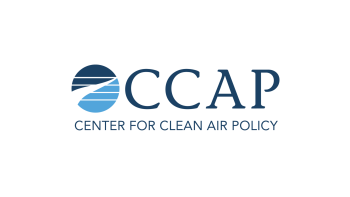Over the past year, the Center for Clean Air Policy (CCAP) has made substantial strides towards its ongoing efforts in supporting developing countries all over the world to reduce their methane emissions from the waste sector. In July 2022, Kenya signed the landmark Sustainable Waste Management Act, instituting the legal and institutional framework to sustainably and effectively manage the country’s waste. Funded by the Climate and Clean Air Coalition (CCAC), CCAP and Earthjustice teamed up to help build domestic capacity in waste management and draft legislation using a wide variety of stakeholder input to ensure successful implementation in the long term.
Waste generation per capita will keep increasing with population and rapid urbanization. As the organic fraction of waste—such as food residues, yard trimmings, paper, or wood—decomposes in landfills or dumpsites, it generates large amounts of methane emissions that lower our air quality and heavily contribute to the warming of our planet.
Methane is among the most potent Short-Lived Climate Pollutants (SLCPs) and is responsible for 40 percent of the Earth’s warming since the Industrial Revolution. Eighteen percent of human-made methane emissions comes from waste, making bills like Kenya’s an incredibly important part of maintaining a habitable planet.
To combat this crisis, CCAP helps some of the most vulnerable countries make use of the waste they produce by developing enabling conditions in the waste sector so that sustainable projects can be implemented quickly and effectively.
These projects include composting facilities which turn methane-producing organic waste into compost which can be sold and used in gardens, landscaping, horticulture, and agriculture, often replacing synthetic fertilizers. Additionally, harmful greenhouse gases produced by waste can be captured and converted into biogas, which is a source of renewable energy that can support local economies and help countries phase out fossil fuels.
This year, CCAP has partnered with ImplementaSur, Environment and Climate Change Canada (ECCC) and the Global Methane Hub to launch and expand the Recycle Organics program, which has been rapidly gaining momentum. The program currently supports 12 developing countries and Small Island Developing States (SIDS) around the world, accelerating methane mitigation projects in the waste sector to bring them closer to reaching their sustainability goals. The Program creates a sustainable expansion of waste management technologies and develops a community of practice within the regions it supports.
The underling goal is to help these countries achieve the Global Methane Pledge of reducing their methane emissions by 30% by 2030, while inherently bringing significant environmental, economic and social benefits to local communities. CCAP has a particular focus on working with developing countries and SIDS since they historically contribute the least to climate change but are typically hit the hardest by its cascading effects. Many of these countries are especially vulnerable to extreme heat, intensified storms, and flooding because of the warming planet, making the goals of the Paris Agreement to keep warming below 1.5°C evermore critical.
Recycle Organics is building on the work done by the original Reciclo Orgánicos program, which took place in Chile from 2017-2022. This program led to a national organic waste strategy as well as the development of 15 composting plants, two bio-digestion initiatives and five gas capture projects and is expected to reduce 9.5 million tons of CO2 by 2040.
The new and expanding Recycle Organics program seeks to similarly reduce the amount of organic waste disposed of in landfills through the optimization of local-level waste management processes internationally. Opportunities to reduce greenhouse gas emissions exist through the implementation of composting plants, anaerobic digesters and the capture of gas from landfills.
The program kicked off this year with the introduction of challenges and opportunities related to reducing methane emissions within specific countries’ waste sectors through in-person workshops, site visits and subsequent engagement across regional platforms. CCAP provides technical assistance to develop a pipeline of the projects within the municipal solid waste sector (MSW), while helping countries overcome regulatory barriers and creating enabling frameworks for project execution. In the long run, the program aims to accelerate participating countries’ progress towards achieving a circular and carbon-neutral waste sector, while safeguarding their heritage and natural ecology for generations to come.
To join our mission to fight climate change and lower emissions worldwide, please consider making a donation today!
There are numerous ways to stay connected with CCAP. Follow us on Twitter (@CCAPolicy) and on Facebook & LinkedIn. Subscribe to our mailing list here.





